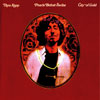
PEARLS BEFORE SWINE : BEAUTIFUL LIES YOU COULD LIVE IN / CITY OF GOLD
-
Beautiful Lies You Could Live In
- Snow Queen
- A Life
- Butterflies
- Simple Things
- Everybody's Got Pain
- Bird on a Wire
- Island Lady
- Come to Me
- Freedom
- She's Gone
- Epitaph
City Of Gold - Sonnet #65
- Once Upon a Time
- Raindrops
- City of Gold
- Nancy
- Seasons in the Sun
- My Father
- The Man
- Casablanca
- Wedding
- Did You Dream of Unicorns
Label : Water Music Records
Length : 61:36
Released : 1971
Review for Beautiful Lies You Could Live In (AllMusic): Released in 1971, Beautiful Lies You Could Live In was the final release of Tom Rapp (guitar/vocals) and Pearls Before Swine. This discounts the 1972 LP Familiar Songs, which was compiled from scraps by Reprise Records and put out as a solo Rapp effort despite protests from Rapp, who has all but disowned it. Unlike the previous pair of PBS Nashville outings, the band - whose core had been condensed to only Rapp and wife Elisabeth (vocals) - had returned to New York and a new set of backing musicians, notably former Mothers of Invention member Billy Mundi (drums), Stu Scharf (guitar), Bob Dorough (piano), Grady Tate (drums), and Amos Garrett (guitar), among others. Rapp's originals continue to reflect his distinctively personal and poignant folk-rock style, apparent on the starkly introverted and haunting "She's Gone" and the Baroque-tinged opener, "Snow Queen." This is contrasted by the laid--back rural "A Life," highlighting Rapp and Elisabeth's tight harmonies, as well as the midtempo narrative "Simple Things." However, it is the cover of Leonard Cohen's "Bird on a Wire" that may garner the most spins. The plaintive lyrics are swaddled in a homey waltz arrangement, capturing the spirit of the piece like few readings have done. The succinct "Epitaph" concludes the album, and is marked by a rare lead vocal from Elisabeth, who set A.E. Housman's "Epitaph on an Army of Mercenaries" to a beautifully mysterious melody that lingers long after the tune has stopped. It is likewise a fitting way to have ended Pearls Before Swine, as Rapp retired the moniker prior to recording Stardancer for Blue Thumb the following year. In 2003, Beautiful Lies You Could Live In was included as part of the four-volume Jewels Were the Stars compendium, anthologizing their final era and output.
Review for City Of Gold (AllMusic)) : "Do not give dogs what is holy; and do not throw your pearls before swine, lest they trample them under foot and turn to attack you" sayeth Jesus in Matthew 7:06. Singer/songwriter Tom Rapp may have taken these words to heart on City of Gold, as the third Reprise album by Rapp and Pearls Before Swine is divided into two parts. Side one of this project, recorded in New York and Nashville in the fall of 1970, is credited to Rapp, while Pearls Before Swine is the band on side two. The music here is country-folk with sparse musicianship and vocals by Rapp, Elisabeth, and David Noyes. Leonard Cohen's soaked-in-harpsichord "Nancy" is a standout on side one, feeling longer than the close to five minutes that it is, while opener "Sonnet No. 65" goes as quickly as it comes, a collaboration between William Shakespeare and Rapp clocking in at 41 seconds. "Once Upon a Time" is true underground country with harmonica and horn battling it out under the bandleader's vocals. "Raindrops" drips with pretty sadness, Elisabeth's voice the answer to what sounds like it should be a soliloquy. The title track's poignancy is interrupted by a gunshot sound effect, country-ish folk with the songwriter's liner notes adding a bit more insight to his mindset on this deep essay. Side two surprises with a very intelligent reading of the Jacques Brel/Rod McKuen tune "Seasons in the Sun," which hit for the Kingston Trio eight years before this version, and four years later in 1974 for Terry Jacks. Elisabeth takes on Judy Collins' "My Father," the movement of the instrumentation way behind the vocals. Four Rapp originals conclude this wandering record, an up-tempo "The Man" followed by a crawling folk-pop "Casablanca," the mood shifting from side one's country to a more polished early-'70s FM approach. "Wedding" is an interesting moment not sounding anything like the other songs here, while "Did You Dream Of" saves the best for last. City of Gold may not be the definitive Pearls Before Swine album, but it is an interesting artifact worthy of a few spins.
